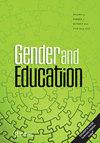教师身份与实践的性别建构:爱尔兰政策文本的女性主义批评话语分析
IF 1.9
3区 教育学
Q2 EDUCATION & EDUCATIONAL RESEARCH
引用次数: 3
摘要
摘要尽管性别和教育研究比比皆是,但在政策和研究中,很少有研究探讨教师身份和实践的性别建构是如何被启用和约束的。在这里,我在爱尔兰教师教育的四个政策文本中对这种性别化的建构进行了女权主义批判话语分析,这四个文本是在经合组织国家和教师有效性主流研究中展开的新自由主义想象中展开的。分析使用了限制的隐喻来解决问题,并产生了更广泛的表征和解放的可能性。研究结果揭示了爱尔兰的这一改革组合如何经常与全球教育改革运动同步,以性别盲的方式限制(如果不是积极限制的话)教师(主要是女性)的声音和能动性,通常是以假定的理论薄弱和父权制的方式。这项研究强调,教师教育的性别政治迫切需要平等而非保守的性别话语。本文章由计算机程序翻译,如有差异,请以英文原文为准。
The gendered construction of teachers’ identities and practices: feminist critical discourse analysis of policy texts in Ireland
ABSTRACT While gender and education studies abound, there are fewer studies examining how the gendered construction of teachers’ identities and practices are enabled, and constrained, in policy and research. Here, I conduct a Feminist Critical Discourse Analysis of this gendered construction in four policy texts in teacher education in Ireland, set within a neoliberal imaginary playing-out across OECD countries, and in mainstream research of teacher effectiveness. The analysis uses a metaphor of confinement to trouble the problem, and to generate wider representations and emancipatory possibilities. The findings reveal how this reform ensemble in Ireland acts more often than not in sync with a global education reform movement in gender-blind ways to constrain, if not actively confine (mostly women) teachers’ voices and agency, often in assumed, theory-weak and patriarchal ways. The study foregrounds the gendered politics of teacher education within a pressing need for egalitarian rather than conservative gender discourses.
求助全文
通过发布文献求助,成功后即可免费获取论文全文。
去求助
来源期刊

Gender and Education
EDUCATION & EDUCATIONAL RESEARCH-
CiteScore
5.20
自引率
9.10%
发文量
31
期刊介绍:
Gender and Education grew out of feminist politics and a social justice agenda and is committed to developing multi-disciplinary and critical discussions of gender and education. The journal is particularly interested in the place of gender in relation to other key differences and seeks to further feminist knowledge, philosophies, theory, action and debate. The Editors are actively committed to making the journal an interactive platform that includes global perspectives on education, gender and culture. Submissions to the journal should examine and theorize the interrelated experiences of gendered subjects including women, girls, men, boys, and gender-diverse individuals. Papers should consider how gender shapes and is shaped by other social, cultural, discursive, affective and material dimensions of difference. Gender and Education expects articles to engage in feminist debate, to draw upon a range of theoretical frameworks and to go beyond simple descriptions. Education is interpreted in a broad sense to cover both formal and informal aspects, including pre-school, primary, and secondary education; families and youth cultures inside and outside schools; adult, community, further and higher education; vocational education and training; media education; and parental education.
 求助内容:
求助内容: 应助结果提醒方式:
应助结果提醒方式:


